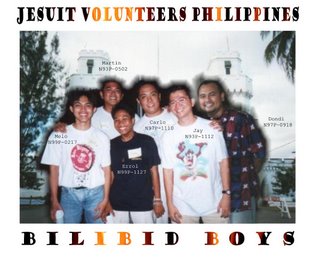remembering bilibid
 (I was a Jesuit Volunteer in Bilibid Prisons for two years. During my stay there, I have witnessed these lethal executions of our brothers in prisons -- six to be precise. But it was announced the other day that there won't be executions anymore. Thanks be to God! Here is something I have written during my Juniorate on my experience of an execution day.)
(I was a Jesuit Volunteer in Bilibid Prisons for two years. During my stay there, I have witnessed these lethal executions of our brothers in prisons -- six to be precise. But it was announced the other day that there won't be executions anymore. Thanks be to God! Here is something I have written during my Juniorate on my experience of an execution day.)
Execution Day
10:58 p.m. Our small two storey dormitory behind an old white painted church was dull and quiet. Only the faint sound of a late night TV show was audible from a distant neighbor. I was sitting by a well-furnished dining table scribbling some encouraging lines to a friend who had a similar no-pay-job like me. As I was about to close my epistle with some customary banter, the lights dimmed into darkness -- something that did not take me by surprise -- and the entire reservation instantaneously hushed. Another desolate prisoner was being transferred to the execution cell. Distant echoes of dogs barking and guards’ commands filled the stillness of the night. I closed my eyes in anticipation. Any moment now. The echoes started to tone down. In a few short moments there was silence. Awkwardly, the lights in the room returned and again I became conscious of the sounds of TV watching. It would be another execution day tomorrow. It would be to remind us that we should kill people in order to show that killing people is bad.
2:00 a.m. I finally got my strength to sleep when suddenly there was an irritating knock at the door. Who could it be at this unholy hour? Still, more knocks. I cautiously opened the door. Three women stood there in front of me covered with their sweaters and jacket. One was a mother in her late 30s; another, a daughter in her mid teens; and still another, a daughter in her late childhood. I recognized that it was the family of the dead-man-walking. I had been expecting them much earlier. Without any reservation, I let them in, knowing that this small dormitory was for now the only place they could call a home away from the complex society. I led them to a prepared room, one of only two small rooms on the second level. I softly asked if they needed anything. Convinced that they were tired, weak and confused, I simply let them rest. Click. All the lights were turned off and I went back to my room. Click. Again, all I saw was darkness. It would be a heavy day tomorrow and I had to get my sleep.
I was just starting to fall into a slumber when a moaning sound brought me to full consciousness. Crying. Someone was crying. No, there were women crying. There was nothing I could do. I kept my eyes open until my body yielded to my weariness.
2:55 p.m. The execution day was one full of unforgettable emotions. The small cube-like death chamber was secured by well armed guards and high wire fences. The four windows were shut. The only door was locked. Inside, the privileged few – the families of the victim and of the accused, penal guards, some representatives from the government, a priest, and a doctor – were all seated quietly, all eyes fixed on the bound and reclining man who would soon meet his fate. The rest of us we were all outside – prison volunteers, seminarians, priests, nuns, reporters, penal employees, and other curious onlookers, with banners and placards displaying all points of view. There were mixed noises of both festivity and mourning. Half were praying for the execution to be repealed, half were praying for the execution to be completed; yet all were waiting. Any moment now. Somebody from the crowd shouted in a husky voice, “It’s three o’clock!” Everybody toned down as if a conductor had signaled the chorus into a pianissimo. Unrestrained whispers were the only sounds perceptible. What was happening inside? We did not know, at least not yet. Ten minutes passed yet everybody maintained the serene silence. At last, the chamber’s door opened. All the people took a deep breath. Six men were coming out carrying at their sides a second-hand coffin, accompanied by the familiar weeping of mother and daughters. Everybody stood very still. The coffin was then loaded into a black funeral car with the 3 ladies seated alongside with the driver. As the car slowly departed, murmurs of questions and speech gradually filled the air again.
Ma Ph
22 July 2004














1 comment:
Post a Comment